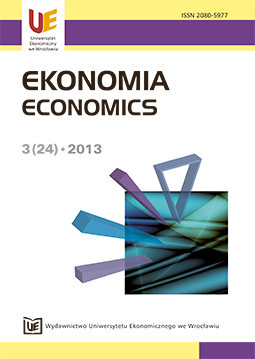Nowoczesne modele analizy gospodarki światowej a ewolucja badań nad międzynarodowymi oddziaływaniami krajowej polityki makroekonomicznej
Modern global economy models in the context of overall ”evolution” in the research on international effects of the macroeconomic policy
Author(s): Agnieszka DomańskaSubject(s): Economy
Published by: Wydawnictwo Uniwersytetu Ekonomicznego we Wrocławiu
Keywords: international economics; global models; international transmission of shocks; economic models
Summary/Abstract: The analysis of the international transmission of the economic shocks and influence, among them the international effects of the national macroeconomic policies, constitutes a very wide and multi-aspectual field of the open economy macroeconomics. Flourishing interest in this field of theory and research, resulting from the post-war dynamic development of the international economic relations (in many facets of this issue) and more broadly − globalization, has led to improving the ”old” schemes and models considered as underlying the core of the open economies’ theory. The evolution of the thougts on international economic linkages and progress made in analysing them were marked by including into the analysis some new assumptions more adequate to the changes observed in the global economy and more perfectly reflecting new tendencies creating modern global ”reality”. All above has led to shaping so called new advanced approach to the open economy macroeconomics. In the empirical aspect, this approach is based on wide implementation of econometric modelling and panel data analysis. As to the theory we can say it is a synthesis – the effect of many years’ scientific research in the field. The aim of the article is to present the new advanced models of the global economy, in particular this part of them which refers to the international transmission of the effects of national macroeconomic (fiscal and monetary) policies and other shocks influencing modern open markets (interest rate shocks, price shocks, terms of trade shocks etc.). To realize so specified goal the following models will be briefly presented: International Monetary Fund’s Multimod, INTERLINK OECD (widely used in the global research in the 80s and the 90s) and the New Global Model OECD (currently implemented). As the background the chosen key steps of the evolution in the theoretical approach as well as empirical research in this stream of the open economy macroeconomics will be overally presented, starting from the Mundell-Fleming model being the crucial turning point of the thoughts on international linkages and macroeconomic policy influence. The author is going to underline the following aspects of the progress which has taken place in the questioned field of research: implementation of new approaches originating from the neo-classical concepts (e.g. the monetary approach to modelling the exchange rates), incorporating the monopolistic competition, monopolistic and oligopolistic economy models into the overall analysis, taking into consideration the short-term effects of the dynamic changes coming from temporary or permanent price, demand or terms of trade shocks, taking the assumption of the incomplete markets and intertemporal choice as an integral part of the analysis.
Journal: Ekonomia
- Issue Year: 2013
- Issue No: 24
- Page Range: 26-43
- Page Count: 18
- Language: Polish

